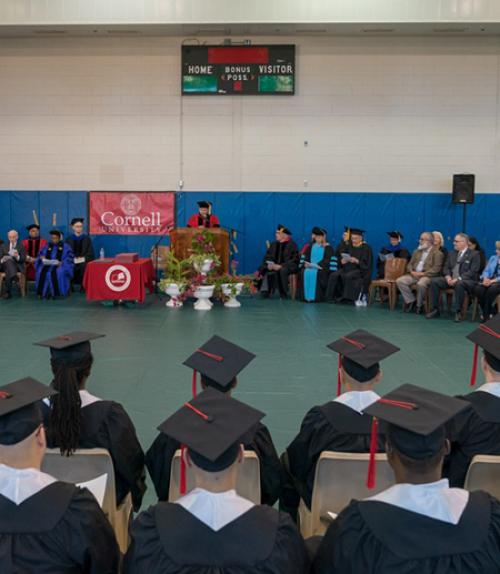The Cornell Prison Education Program (CPEP) has received a grant for $1.7 million to ensure the success of ongoing efforts to accelerate degree completion for incarcerated college students, to look at the benefits of college-in-prison in the broader society, and facilitate Cornell students’ education and engagement in criminal justice reform.
The grant from the Andrew W. Mellon Foundation allows CPEP to build upon work initiated with the support of the foundation – specifically, the program will optimize its educational offerings across four prisons, increase the number of courses offered and enhance programming and curricular engagement for Cornell student contributors.
CPEP aims to provide a model for prison education statewide and nationally, and to contribute in the long term to a reduction in the number of incarcerated Americans.
The grant would not only fortify the existing effort, but allow the study of outcomes and impacts of the program in prison and on campus, said Robert Scott, CPEP executive director.
“CPEP is distinguished by its unique emphasis on bidirectional education,” Scott said. “Incarcerated students receive a liberal arts education, while graduate students and undergraduates from campus receive an engaged education in the criminal justice system.”
During the three-year grant period, CPEP expects to nearly double the number of individuals earning associate degrees (conferred by Cayuga Community College) or a Cornell Certificate in Liberal Arts.
Since 2012, 64 individuals have earned associate of arts degrees through CPEP at the Auburn, Cayuga and Five Points correctional facilities. This year, CPEP began offering classes at the Elmira Correctional Facility, and nine students at Five Points completed the Certificate in Liberal Arts program, led by Cornell faculty and launched in 2017 through the College of Arts and Sciences.
Participation by Cornell graduate students, who serve as instructors in 60 to 70 percent of in-prison courses, has doubled since 2013, Scott said. CPEP also projects an enrollment increase in the Cornell undergraduate minor in Crime, Prisons, Education and Justice, established in 2016 in the College of Arts and Sciences. Roughly one-quarter of the Cornell undergraduates now volunteering as CPEP classroom assistants are studying criminal justice on campus through the minor.
Previous Mellon Foundation support for CPEP included grants to expand the program and build an upstate New York network of college-in-prison providers (2016-18), and to build a consortium of college-in-prison programs throughout New York state (2017-18), explicitly linking program growth with collaboration between Cornell and other colleges in the region.
CPEP’s partners include the New York Department of Corrections and Community Supervision and educators from six other colleges and universities. The University of Rochester has piloted a teaching-in-prison program since 2014 via CPEP, and, like Cornell, is waiving tuition and fees for its courses at Five Points starting this fall.
CPEP has a leadership role in the New York Consortium for Higher Education, which allows programs in New York City and upstate “to meet regularly to compare notes, develop networks to support students as they move through the system, and to begin speaking with a common voice when communicating with state correctional authorities.” The proposed CPEP budget also reflects “support for ongoing consortium activities.”
This article originally appeared in the Cornell Chronicle.




